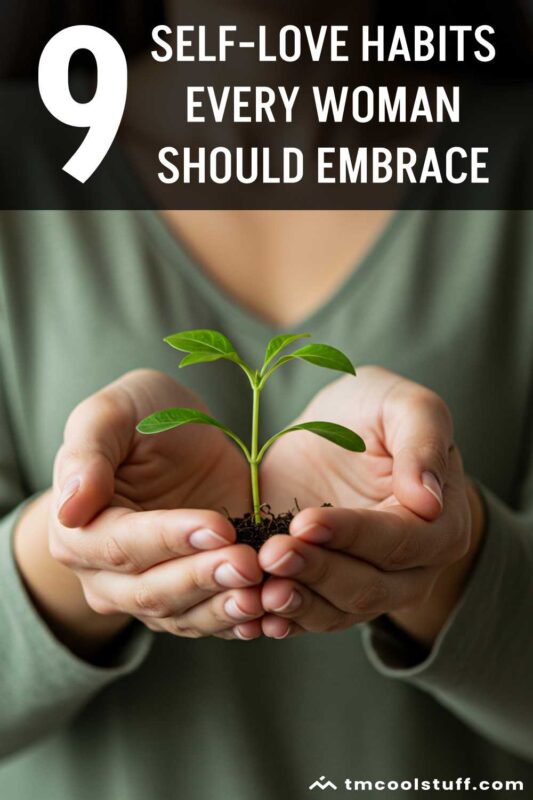Healthy Living, Blog, Tips and Hacks
9 Self-Love Habits Every Woman Should Embrace

Self-love isn’t about bubble baths and face masks—though those have their place. It’s about building a genuine, compassionate relationship with yourself that sustains you through life’s ups and downs. As someone who’s learned this lesson the hard way, I’ve discovered that real self-love shows up in our daily choices, not just our Sunday routines.
Here are nine transformative habits that have helped me and countless other women cultivate authentic self-love that goes beyond surface-level self-care.
Table of Contents
1. Practice Mindful Morning Check-Ins

Instead of immediately reaching for your phone or diving into your to-do list, take five minutes each morning to check in with yourself. Ask simple questions: How am I feeling today? What does my body need? What would make me feel supported right now?
This isn’t about forcing positivity or fixing anything—it’s about developing awareness of your internal landscape. Research shows that mindfulness practices nurture mental health and help you make choices that align with your actual needs rather than external pressures.
Some mornings you might realize you need extra rest, while others you might feel energized and ready to tackle challenges. Both are valid, and honoring these fluctuations is a profound act of self-respect.
2. Set Boundaries That Actually Serve You

Boundaries aren’t walls—they’re guidelines that help you maintain your energy and integrity. This means saying no to the dinner invitation when you’re genuinely exhausted, not apologizing for having preferences, and recognizing that your time and emotional energy are valuable resources.
Start small. Maybe it’s not answering work emails after 8 PM, or telling your friend you can’t be her therapist for every relationship drama. The discomfort you feel initially is normal—you’re rewiring patterns that may have been in place for years.
Remember, healthy boundaries often disappoint people who benefit from your lack of them. That’s not your problem to solve.
3. Develop a Journaling Practice That Goes Beyond Gratitude

While gratitude journaling has its merits, transformative journaling digs deeper. Journal prompts help you identify your thoughts and feelings, acknowledge them, and create space for self-love and healing.
Try prompts like: What story am I telling myself about this situation? Where did I compromise my values today, and how can I honor them tomorrow? What would I tell my best friend if she were in my situation?
The magic happens when you write without censoring yourself. Let the messy, contradictory, imperfect thoughts flow onto the page. This practice builds self-awareness and helps you become your own wise counselor.
4. Move Your Body in Ways That Feel Good

Exercise doesn’t have to mean punishment or pushing through pain. It can be dancing in your kitchen, taking a walk to clear your head, or stretching while watching Netflix. The goal is to reconnect with your body as a source of pleasure and strength, not just something to be fixed or improved.
Pay attention to how different types of movement make you feel. Maybe running leaves you energized, while yoga helps you feel grounded. Maybe swimming makes you feel powerful, while hiking connects you to nature. Honor these preferences instead of forcing yourself into someone else’s idea of the “right” workout.
5. Curate Your Inner Voice

We all have that internal narrator commenting on our choices, appearance, and worth. The difference between self-love and self-criticism often comes down to the tone of this voice. Would you speak to your best friend the way you speak to yourself?
Start noticing when your inner voice becomes harsh or dismissive. Instead of trying to force positive thoughts, try neutral ones. Replace “I’m so stupid for making that mistake” with “I made a mistake, and that’s human.” This isn’t about lying to yourself—it’s about speaking to yourself with basic respect.
6. Invest in Relationships That Energize You

Self-love includes being selective about who gets access to your time and emotional energy. Notice which relationships leave you feeling drained versus those that leave you feeling seen and supported.
This doesn’t mean cutting off everyone who’s going through a difficult time, but it does mean recognizing when relationships are consistently one-sided. Healthy relationships involve mutual support, respect, and genuine interest in each other’s wellbeing.
Sometimes self-love means having difficult conversations about what you need from a relationship. Sometimes it means creating distance from people who consistently undermine your growth.
7. Create Non-Negotiable Daily Rituals

These don’t have to be elaborate or time-consuming. Maybe it’s making your coffee exactly how you like it, reading for ten minutes before bed, or listening to music that moves you during your commute. The key is consistency and intentionality.
Even 5 minutes of meditation, a gratitude list, or a mindful shower can be self-love acts when you schedule them like important appointments. These small rituals become anchors that remind you that you matter enough to invest in your own wellbeing.
8. Learn to Sit With Discomfort Without Immediately Fixing It

One of the most radical acts of self-love is allowing yourself to feel difficult emotions without immediately trying to escape or fix them. This means sitting with anxiety instead of immediately distracting yourself, or feeling sadness without rushing to “get over it.”
This isn’t about wallowing or becoming overwhelmed—it’s about developing emotional resilience. When you can be present with your difficult feelings, they lose some of their power over you. You realize that emotions are temporary visitors, not permanent residents.
9. Regularly Assess and Adjust Your Life to Align With Your Values

Self-love requires ongoing honest assessment of whether your life reflects what you actually value. This might mean leaving a job that drains your soul, ending a relationship that no longer serves you, or changing friendships that have become toxic.
Ask yourself regularly: If I knew I couldn’t fail, what would I do differently? What aspects of my life am I tolerating rather than choosing? Where am I living according to other people’s expectations instead of my own values?
These questions can be uncomfortable, but they’re essential for building a life that feels authentic rather than performative.
The Long Game of Self-Love
Real self-love isn’t a destination—it’s a practice that evolves as you do. Some days you’ll nail it, and other days you’ll fall back into old patterns of self-criticism or people-pleasing. That’s not failure; that’s being human.
The goal isn’t perfection but consistency in choosing yourself, especially when it’s inconvenient or when others might not understand. Every time you honor your needs, speak to yourself with kindness, or make a choice that aligns with your values, you’re building a stronger, more authentic relationship with yourself.
In a world that often tells women to be smaller, quieter, or more accommodating, self-love is a quiet revolution. It’s the foundation that allows you to show up fully in your relationships, pursue your goals with confidence, and navigate life’s challenges from a place of inner strength rather than external validation.
Start where you are, with what you have. Your future self will thank you for every small step you take toward treating yourself with the love and respect you deserve.
